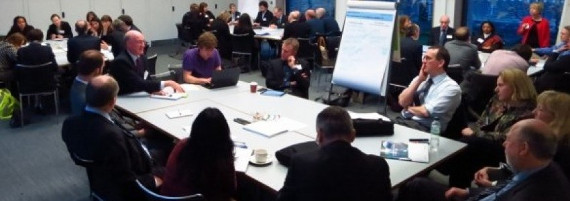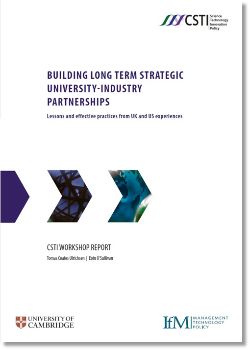Building strategic university-industry partnerships: lessons from the UK and US

 |
| Download the full report |
| Download the summary findings |
Many large research intensive firms are looking to consolidate the number of universities they work with. Critically, many are identifying a core set of partners with which to form longer term, deeper and more strategic relationships. If successful, these partnerships can unlock significant additional value for both firms and universities. Worryingly, however, for the UK and US, these decisions are becoming increasingly global with competition emerging from key emerging economies.
This report – authored by Tomas Coates Ulrichsen and Eoin O’Sullivan – explores what can be done by universities and their industrial partners to build and nurture mutually beneficial and effective strategic partnerships. It draws on the expert insights and experiences of 70+ senior thought-leaders from leading UK and US universities, major research-intensive multinational firms, and UK and US government funding agencies gathered during a major UK-US workshop on this topic in 2014. The workshop hosted by CSTI in partnership with PraxisUnico, the University-Industry Demonstration Partnership and the Science and Innovation Network.
A key factor driving successful partnerships is the development of a strong understanding not just of each others’ needs, but also of their capabilities, working practices and constraints (related to working with universities/firms). This helps to build mutually beneficial value propositions, more realistic assessments of what can be achieved together, and an understanding of how to realise value.
Central to the sustainability of these partnerships is the ability to adapt to changing needs and conditions. Flexibility and the willingness to learn about what works and doesn’t is paramount. In addition, partnership support and boundary spanning functions are important and need adequately resourcing.
The authors would like to thank all of the participants at the workshop and, in particular, the speakers from: Harvard University, Georgia Institute of Technology, University of California Berkeley, University of Cambridge, University of Oxford, University College London, Coventry University, Boeing, BP, GSK, Pfizer, P&G, IBM, Northrop Grumman, EPSRC, NSF, University-Industry Demonstration Partnership and PraxisUnico.
Help inform practice and policy development supporting strategic partnerships!
Take the survey addressing key issues arising from workshop
The workshop identified a number of key areas for further development for building mutually beneficial and effective university-industry strategic partnerships. To address a number of these, we are updating the workshop survey to cover key topics:
- Examining the types of value strategic partnerships generate to help us develop a framework for assessing value;
- Understanding what affects university partner choice to inform policy development and inward investment support programmes;
- Identifying key challenges that need to be overcome to realise value from these partnerships to help partners and government agencies develop more effective and targeted support;
- Updating key trends and emerging locations to help us understand how the landscape is shifting.
Your views would be greatly appreciated. To have your say, please click here. The survey should take approximately 15 minutes to complete.
As a thank you, the first 50 respondents in the target sample will be offered a free hard copy of the workshop report. All respondents will be sent advanced e-copies of new reports should they wish to receive them.
All responses will be treated in the strictest of confidence and presented in aggregate only. No individual-level information will ever be shared. Your contact information will never be shared.
For further information about the report, or to engage with research in this area, please contact Tomas Coates Ulrichsen.










